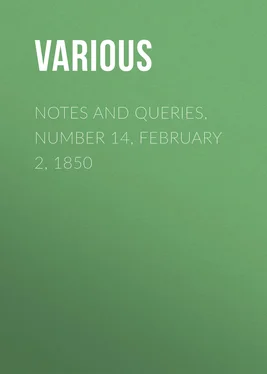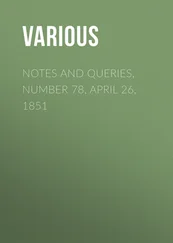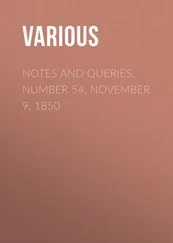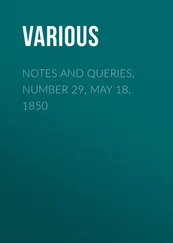Various - Notes and Queries, Number 14, February 2, 1850
Здесь есть возможность читать онлайн «Various - Notes and Queries, Number 14, February 2, 1850» — ознакомительный отрывок электронной книги совершенно бесплатно, а после прочтения отрывка купить полную версию. В некоторых случаях можно слушать аудио, скачать через торрент в формате fb2 и присутствует краткое содержание. Жанр: foreign_antique, periodic, foreign_edu, на английском языке. Описание произведения, (предисловие) а так же отзывы посетителей доступны на портале библиотеки ЛибКат.
- Название:Notes and Queries, Number 14, February 2, 1850
- Автор:
- Жанр:
- Год:неизвестен
- ISBN:нет данных
- Рейтинг книги:5 / 5. Голосов: 1
-
Избранное:Добавить в избранное
- Отзывы:
-
Ваша оценка:
- 100
- 1
- 2
- 3
- 4
- 5
Notes and Queries, Number 14, February 2, 1850: краткое содержание, описание и аннотация
Предлагаем к чтению аннотацию, описание, краткое содержание или предисловие (зависит от того, что написал сам автор книги «Notes and Queries, Number 14, February 2, 1850»). Если вы не нашли необходимую информацию о книге — напишите в комментариях, мы постараемся отыскать её.
Notes and Queries, Number 14, February 2, 1850 — читать онлайн ознакомительный отрывок
Ниже представлен текст книги, разбитый по страницам. Система сохранения места последней прочитанной страницы, позволяет с удобством читать онлайн бесплатно книгу «Notes and Queries, Number 14, February 2, 1850», без необходимости каждый раз заново искать на чём Вы остановились. Поставьте закладку, и сможете в любой момент перейти на страницу, на которой закончили чтение.
Интервал:
Закладка:
Various
Notes and Queries, Number 14, February 2, 1850
NOTES
ENGLISH AND AMERICAN REPRINTS OF OLD BOOKS
Most people are aware of the great demand there is for English literature, and indeed for all literature in the United States: for some years the anxiety of persons in that part of the world to obtain copies of our early printed books, prose, poetry, and plays, has been well known to such as collect and sell them on this side of the water. Where American purchasers could not obtain original editions they have, in all possible cases, secured reprints, and they have made some themselves.
Not very long since a present of a most creditable and well-edited republication of "Four Old Plays" was sent to me from Cambridge, U.S., consisting of "Three Interludes: Thersytes , Jack Jugler , and Heywood's Pardoner and Frere ; and Jocasta , a tragedy by Gascoigne and Kinwelmarsh." They are preceded by a very well written and intelligent, and at the same time modest, Introduction, signed F.J.C., the initials of Mr. Francis James Child; who in fact was kind enough to forward the volume to me, and who, if I am not mistaken, was formerly a correspondent of mine in a different part of the republic.
My particular reason for noticing the book is to impress upon editors in this country the necessity of accuracy, not only for the sake of readers and critics here, but for the sake of those abroad, because Mr. Child's work illustrates especially the disadvantage of the want of that accuracy. It so happens that two, if not three, of the pieces included in the Cambridge volume, are absolutely unique, and are now in the library of the Duke of Devonshire. They went through my hands some years ago, and as they had been previously reprinted in London (two of them for the Roxburghe Club), I took the opportunity of collating my copies of them. The third interlude, which was not reprinted for any society, but as a private speculation, "by George Smeeton, in St. Martin's Church-yard," is Heywood's Pardoner and Frere , the full title of which is " A mery playe betwene the pardoner, and the frere, the curate and neybour Pratte ." The original copy has the following imprint: "Imprynted by Wyllyam Rastell the v. day of Apryll, the yere of our lorde, M. CCCCC. xxx III."
The reprint by Smeeton is in black letter, and it professes to be a fac-simile, or as nearly so as possible; and although it consists of only eight leaves, it contains no fewer than forty variations from the original, all more or less important, and one of them the total omission of a line, so that the preceding line is left without its corresponding rhyme, and the sense materially injured.
Unfortunately, Mr. Child reprinted in America from this defective reprint in England; but his sagacity prevented him from falling into some of the blunders, although it could not supply him with the wanting line; and his notes are extremely clear and pertinent. I shall not go over the thirty-nine other errors; but I shall just quote the passage as it stands in the (as far as I know) unique copy, now deposited at Devonshire House, and supply in italics the necessary line. It occurs in a speech by the Pardoner, near the end, where he is praising one of his relics:—
"I wyll edefy more, with the syght of it
Than wyll all the pratynge of holy wryt;
For that except that the precher, hym selfe lyue well,
His predycacyon wyll helpe neuer a dell,
And I know well, that thy lyuynge is nought:
Thou art an apostata, yf it were well sought ,
An homycyde thou art I know well inoughe," &c.
The line omitted is the more remarkable, because it contains an instance of the employment of a word very old in our language, and in use in the best periods of our prose and poetry: "apostata" is explained in the Promptorium , is found in Skelton and Heywood, and so down to the time of Massinger, who was especially fond of it.
How many copies were issued of Smeeton's reprint of The Pardoner and the Frere , I know not; but any of your readers, who chance to possess it, will do well to add the absent line in the margin, so that the mistake may be both rectified and recorded. I was not aware of Mr. Child's intention to re-publish the interlude in the United States, or I would long ago have sent him the correction, as indeed I did, a day or two after I received his volume. It was, nevertheless, somewhat ungracious to thank him for his book, and at the same time to point out an important error in it, for which, however, he was in no way responsible.
J. PAYNE COLLIER.Kensington, Jan. 28. 1850.
CATACOMBS AND BONE-HOUSES
Without attempting to answer the queries of MR. GATTY, (No. 11. p. 171.) I venture to send a note on the subject. I believe it will generally be found that the local tradition makes such collections of bones to be "the grisly gleanings of some battlefield." One of the most noteworthy collections of this kind that I have seen is contained in the crypt of Hythe Church, Kent, where a vast quantity of bones are piled up with great regularity, and preserved with much care. According to a written statement suspended in the crypt, they are the relics of Britons and Saxons slain in a battle fought on the beach in the sixth century; the local tradition is nearly to the same effect, but of course is of little value, as it has most likely arisen from or been conformed to this "written chronicle;" both writing and tradition must indeed be regarded with distrust. It is affirmed in the neighbourhood that the bones were dug up from the beach; but I, at least, could hear of no tradition as to the period when they were exhumed. Perhaps some resident will ascertain whether any such exists.
The bones have all the appearance of considerable antiquity; yet they are in excellent preservation. The skulls are remarkably white and perfect, and are altogether a very curious collection, differing greatly in size, form, and thickness. The holes and fractures in many of them (made evidently during life) leave no doubt that they belonged to persons who met with a violent death.
I will not pretend to reply to the concluding queries of your correspondent, but I would just remark that, from what we know of the feeling of our ancestors respecting the remains of the dead, it appears probably that if from any cause a large quantity of human bones were found, or were from any cause obliged to be disturbed, some ecclesiastic or pious layman would take measures to have them removed to some consecrated spot where they might be safe from further molestation. They would hardly be treated in any such manner as Dr. Mantell states the bones removed by the railway engineers from the Priory ground at Lewes were treated. I remain, sir, your very obedient servant,
J.T.Syndenham, Jan. 21. 1850.
LINES ATTRIBUTED TO HUDIBRAS
Perhaps the following extract from a volume entitled The Relics of Literature , published by Boys and Co., Ludgate Hill, 1820, may prove interesting, as further illustrating the so frequently disputed passage which forms the subject matter of your first article in No. 12.:—
"Few popular quotations have more engaged the pens of critics than the following:—
'For he that fights and runs away
Will live to fight another day.'
"These lines are almost universally supposed to form a part of Hudibras ; and, so confident have even scholars been on the subject, that in 1784 a wager was made at Bootle's, of twenty to one, that they were to be found in that inimitable poem. Dodsley was referred to as the arbitrator, when he ridiculed the idea of consulting him on the subject, saying, 'Every fool knows they are in Hudibras .' George Selwyn, who was present, said to Dodsley, 'Pray, sir, will you be good enough, then, to inform an old fool, who is at the same time your wise worship's very humble servant, in what canto they are to be found?' Dodsley took down the volume, but he could not find the passage; the next day came, with no better success; and the sage bibliopole was obliged to confess, 'that a man might be ignorant of the author of this well-known couplet without being absolutely a fool.'"
Читать дальшеИнтервал:
Закладка:
Похожие книги на «Notes and Queries, Number 14, February 2, 1850»
Представляем Вашему вниманию похожие книги на «Notes and Queries, Number 14, February 2, 1850» списком для выбора. Мы отобрали схожую по названию и смыслу литературу в надежде предоставить читателям больше вариантов отыскать новые, интересные, ещё непрочитанные произведения.
Обсуждение, отзывы о книге «Notes and Queries, Number 14, February 2, 1850» и просто собственные мнения читателей. Оставьте ваши комментарии, напишите, что Вы думаете о произведении, его смысле или главных героях. Укажите что конкретно понравилось, а что нет, и почему Вы так считаете.












